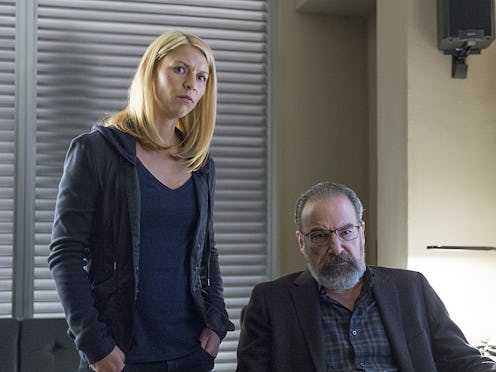News
Why Hillary & Obama Are Fans Of 'Homeland'

The latest batch of Hillary Clinton emails just hit the Internet, and so far, they appear pretty innocuous. One message has received some attention: It seems Clinton is a fan of Homeland , and at one point asked an advisor what channel Showtime was so that she could watch the show. Clinton isn’t the only high-profile politician who’s proclaimed their love for the CIA drama, which is now in its fifth season. President Obama is a Homeland buff too, and has joked about his fandom with the show's cast. None of this is too surprising. It’s pretty clear why Clinton and Obama like Homeland.
I’ll admit right off the bat that I haven’t watched the latest season of the show (yet). I’ve seen the first four, though, and thoroughly enjoyed all of them ― even the widely-maligned Season 3. For the uninitiated, Homeland is about Carrie Mathison (Claire Danes), a CIA agent tasked with thwarting terrorist attacks. One of the most refreshing and enjoyable things about the show is its frank acknowledgement of the many moral ambiguities in U.S.-Middle Eastern relations, the war on terror, and CIA intervention abroad. Obama and Clinton, broadly speaking, are also aware of these ambiguities, as evidenced by aspects of their foreign policies. Thus, it’s natural that they’d enjoy Homeland.
(I’ll avoid moderate and major spoilers here, but I will reveal general themes of the show. Don’t read on if you want to know absolutely nothing about Homeland before watching it for the first time.)
For example, significant parts of the show focus on drone strikes in the Middle East ― and more importantly, their role in radicalizing local populations. The show doesn’t try to hide the fact that U.S. drone strikes often kill civilians and children. In fact, several scenes depict the bloody aftermath of such strikes. In real life, the idea that drone strikes motivate locals to sympathize with anti-U.S. groups is very contentious, and that's reflected in the way Homeland depicts government officials arguing with one another about the value of such strikes
At the same time, the show also demonstrates that drone strikes can, on occasion, be effective in eliminating threats. Ultimately, the series doesn’t weigh in on the question of whether drones are ultimately worth it in regard to U.S. security. It simply recognizes that those who join Middle Eastern terrorist groups may be motivated, at least initially, by real grievances that have nothing to do with religious fervor or a blanket hatred of Western values.
In dealing with terrorism in the Middle East, Obama and Clinton have adopted a similarly nuanced perspective. The Obama administration has launched many drone strikes, and as in Homeland (which depicts a strike accidentally hitting a wedding), real life strikes have sometimes had tragic results. According to one tally reported by The Huffington Post, about 90 percent of those killed in drone strikes in Afghanistan were not the intended targets. But Obama has also acknowledged that American policies in the Middle East, such as the invasion of Iraq and the CIA’s role in overthrowing democratically-elected leaders, have sometimes made it easier for terrorists to recruit members.
“We have to address grievances terrorists exploit,” Obama said earlier this year when discussing ISIS. “The reality — which, again, many Muslim leaders have spoken to — is that there’s a strain of thought that doesn’t embrace ISIL’s tactics, doesn’t embrace violence, but does buy into the notion that the Muslim world has suffered historical grievances — sometimes that's accurate.”
While Clinton is somewhat more hawkish than Obama on foreign policy, she nevertheless acknowledges that the U.S. can’t adopt a simplistic mindset in its fight against terrorism. “I don't think you can paint with a broad brush. This is an incredibly complicated region of the world. It's become more complicated,” she said in a recent Democratic debate. “Historically, it is important to try to understand your adversary in order to figure out how they are thinking, what they will be doing, how they will react.”
Other things about Homeland surely appeal to Obama and Clinton. While the show is of course fiction, it has moments of accuracy that are unusual in popular depictions of U.S. foreign policy. Season 4, for example, does an excellent job of portraying the contentious and bizarre alliance between the U.S. and Pakistan. Geopolitically, the two countries are essentially frenemies, and the show nails this. This realism no doubt appeals to Obama and Clinton, who’ve spent years of their lives dealing with such nuances.
The show also has several strong female characters. Mathison is one of the best protagonists on television, and Season 4 features Martha Boyd (Laila Robins), an extremely competent U.S. ambassador. Both Clinton and Obama are all about empowering women. Obama appointed two women to the Supreme Court and vastly expanded contraceptive coverage, among other policies, while Clinton's feminist credentials require no further elaboration.
While Homeland is ultimately entertainment and not education, it refuses to take intellectual or moral shortcuts in its portrayal of U.S. foreign policy. So do Clinton and Obama, so it makes perfect sense that both would be fans of the show.
Image: Showtime (1)